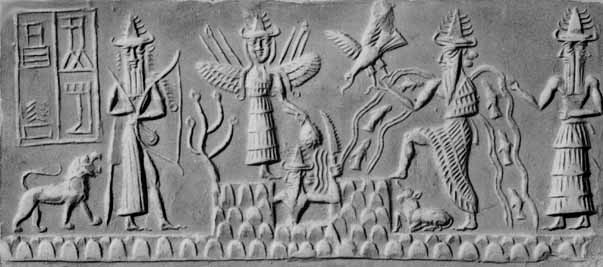 "Enki walks out of the water to the land attended by his messenger, Isimud who is readily identifiable by his two faces looking in opposite directions (duality)." http://www.crystalinks.com/sumercylinderseals.html
"Enki walks out of the water to the land attended by his messenger, Isimud who is readily identifiable by his two faces looking in opposite directions (duality)." http://www.crystalinks.com/sumercylinderseals.htmlCuneiform texts attest to the presence of Meluhha settlements in Sumer. [The Meluḫḫa Village: Evidence of Acculturation of Harappan Traders in Late ThirdMillennium Mesopotamia?Author(s): Simo Parpola, Asko Parpola, Robert H. Brunswig, Jr.Source:Journal of the Economic and Social History of the Orient, Vol. 20, No. 2 (May, 1977),pp. 129-165].
The major contribution made by Meluhhans in Sumer was tin as an alloying mineral to create tin-bronzes (to complement naturally-occurring copper + arsenic ores for arsenic bronzes).
Meluhhan artisans in Sumer used Indus writing to create metal-ware catalogs. This is exemplified by the 'water-buffalo' glyph used on some cylinder seals.
kaṇḍ‘buffalo’; rebus: kaṇḍ‘stone (ore)’. Meluhha was the habitat for the water-buffalo.
While cuneiform script was used to write names syllabically or to record benedictions ('short invocations for divine help'), rest of the writing (for e.g. on cylinder seals) used hieroglyphs.
http://www.crystalinks.com/sumercylinderseals.html
 Impressions of two cylinder seals (Sumer) and glyph of 'ingot'. The person at the feet of the eagle-winged person carries a (metal) dagger on his left-hand, clearly demonstrating the link with this metalware catalog.
Impressions of two cylinder seals (Sumer) and glyph of 'ingot'. The person at the feet of the eagle-winged person carries a (metal) dagger on his left-hand, clearly demonstrating the link with this metalware catalog.Note the one-horned bull below the person who has his foot on mountain-summit.
Sumerian sign for the term ZAG ‘purified precious’. The ingot had a hole running through its length Perhaps a carrying rod was inserted through this hole.
Enki: ‘Meluhha…black land of large trees…whose laden boats transport gold and silver.’
Rebus readings of glyphs on these cylinder seal impressions, based on some possible meluhha (mleccha) substrate lexemes of Indian sprachbund :
aryeh 'lion' (Akkadian). Rebus: āra ‘brass’ as in ārakūṭa (Skt.)
meḍha ‘polar star’ (Marathi). meḍ ‘iron’ (Ho.Mu.) The crescent-shaped glyph connotes ‘ingot’.
kuṭi ‘tree’. Rebus: kuṭhi ‘smelter furnace’ (Mu.) kōṭu branch of tree (DEDR 2200). Rebus: M.khoṭā ʻalloyedʼ (CDIAL 3931).
kola 'woman' (Nahali). Rebus: kol 'working in iron' (Tamil). Quivers are shown on her shoulders: khōli f. ʻquiverʼ; rebus: kol 'working in iron'; thus, a phonetic determinative.
kamaḍha 'archer'. Rebus: kampaṭṭam ‘coiner, mint’ (Tamil)
kāṇḍīra ʻarmed with arrowsʼ Pāṇ., m. ʻarcherʼ (CDIAL 3026)kãḍerā m. ʻ a caste of bow -- and arrow -- makers ʼ.(CDIAL 3024). Rebus: khāṇḍā ‘metalware, tools, pots and pans’(Marathi).
ṭakuru m. ʻmountain ʼ; ḍumgara ‘mountain’ (Pkt.)(CDIAL 5423). Rebus: damgar ‘merchant’.
kõdā खोंड [ khōṇḍa ] m A young bull, a bullcalf. (Marathi) Rebus: A. kundār, B. kũdār, °ri, Or. kundāru; H. kũderā m. ʻone who works a lathe, one who scrapesʼ, °rī f., kũdernā ʻ to scrape, plane, round on a lathe ʼ.(CDIAL 3297).
kōṭ ‘horn’. Rebus: M.khoṭā ʻalloyedʼ (CDIAL 3931)
kōṭu summit of a hill (Ta.). Rebus: खोट [ khōṭa ] f A mass of metal (unwrought or of old metal melted down); an ingot or wedge. Hence खोटसाळ [ khōṭasāḷa ] a (खोट &साळ from शाला) Alloyed--a metal. (Marathi) Bshk. khoṭ ʻembersʼ, Phal. khūṭo ʻashes, burning coalʼ; L. khoṭf. ʻalloy, impurityʼ, °ṭā ʻalloyedʼ, awāṇ. khoṭā ʻforgedʼ; P. khoṭ m. ʻbase, alloyʼ M.khoṭā ʻalloyedʼ (CDIAL 3931)
khaṇḍa ʻhill pastureʼ (Gaw.)(CDIAL 3792). Rebus: khāṇḍā ‘metalware, tools, pots and pans’.
Glyph: ḍhol ‘a drum beaten on one end by a stick and on the other by the hand’ (Santali); ḍhol ‘drum’ (Nahali); dhol (Kurku); ḍhol (Hi.) dhol a drum (G.)(CDIAL 5608) డోలు [ḍōlu ] [Tel.] n. A drum. Rebus: dul ‘to cast in a mould’; dul mẽṛhẽt, dul meṛeḍ, dul; koṭe meṛeḍ ‘forged iron’ (Santali) WPah.kṭg. (kc.) ḍhōˋḷ m. ʻstoneʼ, kṭg. ḍhòḷṭɔ m. ʻbig stone or boulderʼ, ḍhòḷṭu ʻsmall id.ʼ Him.I 87.(CDIAL 5536).
Or. kāṇḍa, kã̄ṛ ʻstalk, arrow ʼ(CDIAL 3023). Rebus: khāṇḍā ‘tools, pots and pans, metal-ware’. ayaskāṇḍa ‘a quantity of iron, excellent iron’ (Pāṇ.gaṇ)
eṟaka ‘wing’ (Telugu). eruvai = copper (Ta.lex.) eraka, er-aka = any metal infusion (Ka.Tu.); erako molten cast (Tulu)
pajhar ‘eagle’; rebus: pasra ‘smithy’.
anzu ‘eagle’ (Sumerian) ancu ‘iron’ (Tocharian)
Wpah. khaḍḍā ‘stream’. Rebus: Pk. khaḍḍā ‘mine’ khaḍḍaga -- m. ʻ one who digs a hole ʼ (CDIAL 3790). kāṇḍaWater; sacred water. Rebus: khāṇḍā ‘tools, pots and pans, metal-ware’. ayaskāṇḍa‘a quantity of iron, excellent iron’ (Pāṇ.gaṇ)I suggest that the glyphs of flowing water with fishes in the stream denotes ayaskāṇḍa 'metal-ware, metal tools, metl pots and metal pans'.
Te. kōḍu rivulet, branch of a river; Ta. kōṭu bank of stream or pool (DEDR 2200). Rebus: M.khoṭā ʻalloyedʼ (CDIAL 3931)
ayo ‘fish’; rebus: ayas ‘metal’.
Read on...Indus writing in ancient near East
Also available from flipkart.com